Lance Armstrong Learned to Walk Again
It's the story and character that many cycling fans wish would disappear to never render, but the story of Lance Armstrong continues to be one that dominates the sport. Any slight update in the life of the Texan or provocative soundbite continues to be devoured.
Enter, therefore, ESPN's latest 30 for 30 documentary, merely titled 'Lance'. Over three hours, filmmaker Marina Zenovich gains access to Armstrong who promises he is now finally done with lying, besides as his family, former squad-mates, friends, and enemies.
The whole story is told from start to finish in the true American sports documentary style you'd expect, with the first part available via the ESPN Player from Monday May 25 and the second office airing on May 31. 'Lance' follows the network's success with 'The Last Dance', which documents basketball legend Michael Jordan's career. Lance Armstrong is another intriguing figure who transcends his sport.
But what does this new documentary tell u.s. that the other ones don't? Having had a few years to reflect on everything since his doping confession to Oprah Winfrey, Armstrong is as antagonistic as e'er, and historic period hasn't completely mellowed the 48-year-erstwhile as he sheds new calorie-free on the greatest doping scandal in sporting history.
His expectations of life after Oprah
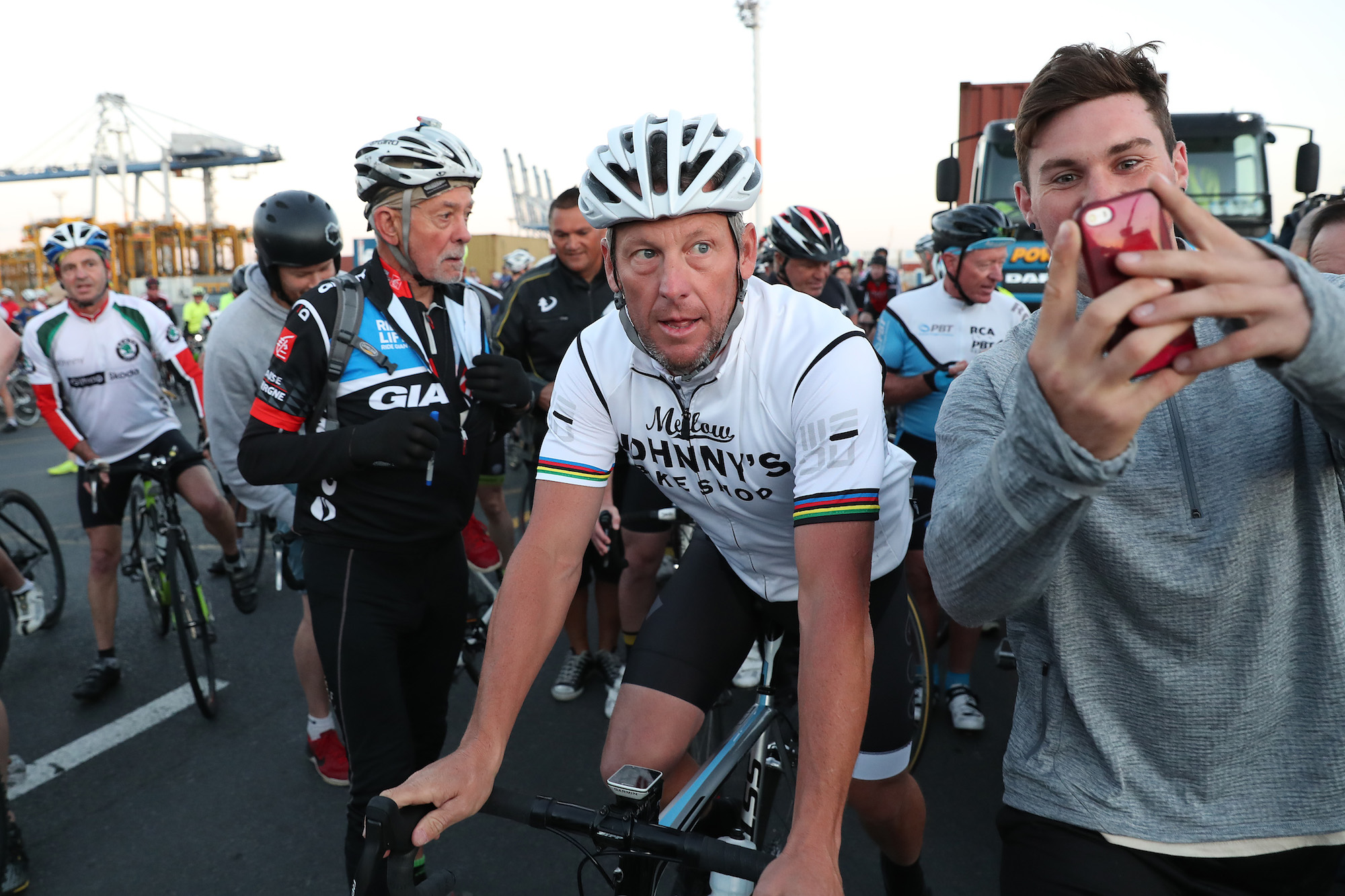
Lance Armstrong in Auckland, New Zealand, in 2022 (Getty)
(Prototype credit: Getty Images)
The bigger you lot are the harder yous fall, a notion that was not lost on Lance Armstrong in the aftermath of his doping confession in 2013.
"When my life took the turn that information technology took, I said to myself that everywhere that I get for the residuum of my life somebody is going to walk up to me and say 'f*ck y'all'.
"And so a couple of days go by and nobody says f*ck you lot, then months go past and years go past...I e'er know when somebody wants to say f*ck you just nobody does, nobody always does. It took five years..."
That incident, v years later, involved a grouping of guys outside a bar who spotted Armstrong and yelled profanities at him. Instead of Armstrong marching over there, which he says he would accept washed in years past, he instead chosen the bar upwards and gave his credit card details to pay for the group'due south food and drinks.
"I have to act, I'm me. Me. Lance Armstrong doesn't merely let sh*t like that happen and not do something," the Texan explains.
The offer had a grab, though.
"Y'all [the bartender] have to get out in that location and say, 'guys, Lance took care of everything and he sends his love.'"
Robbed of his accolades, star power, respect, Armstrong even so has one affair that gives him ability, money. His podcast generates $1 meg in acquirement, while an early $100,000 investment in Uber netted him tens of millions of dollars, saving him from the financial ruin of the lawsuits that followed his doping admittance.
Was the conciliatory gesture to the guys in the bar a sincere apology? While Armstrong may have lost the statement, the fact he can still flex his financial might permit him to still have the last word.
Armstrong started doping aged 21, seven years earlier his kickoff Tour de France victory
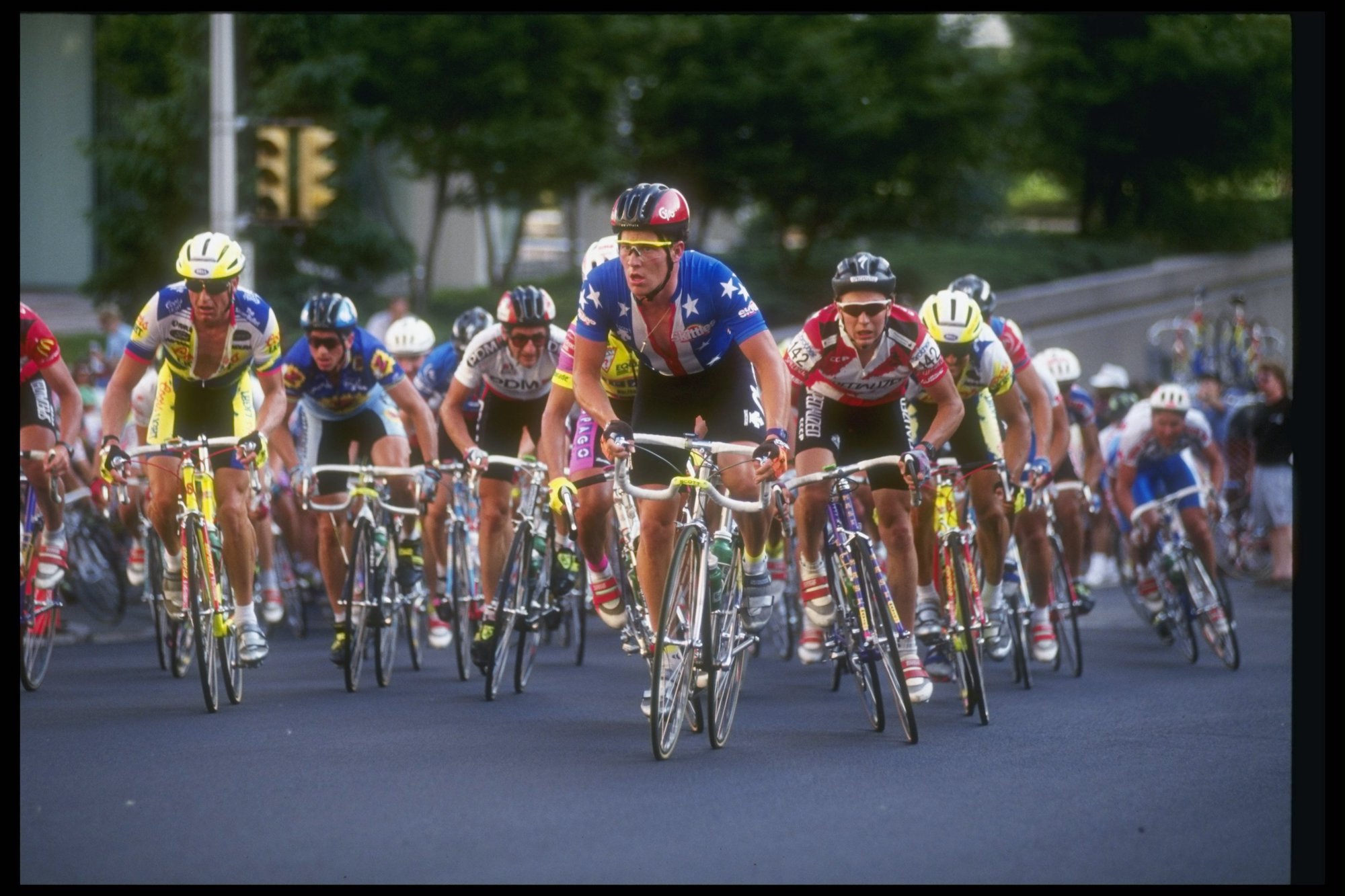
Lance Armstrong at the 1991 Tour DuPont (Joe Patronite /Allsport/Getty)
(Prototype credit: Getty Images)
One of the starting time questions asked is at what age Armstrong started doping. He balks: "Wow straight into that. I was probably 21."
In the Oprah interview, Armstrong admitted to doping to win all 7 of his Tour de France titles, but the rainbow jersey he won in 1993, six years before his first yellow ane, is the biggest victory of his that still stands.
Information technology would appear Armstrong has now allow go of this victory too, albeit he started using cortisones during his first professional flavour the year before the 1993 Route World Championships in Oslo.
"The rumours of EPO began in 1993, but people were scared of information technology," Armstrong says. "There were all these ideas that people were dying from it. Then I won the Worlds in '93 somehow, wore the rainbow jersey through '94 and got my ass kicked all year long, wearing the earth champion's bailiwick of jersey.
"Nosotros had already been dabbling in low-octane cortisone, whatever was around, just EPO was a whole other level. The performance benefits were and then great that the sport went from low-octane to this really high-octane rocket fuel, so that was the conclusion we had to make. "
Armstrong says for ii seasons in 1994 and 1995 him and his team refused to touch EPO and subsequently struggled for results.
"EPO was like wildfire but we refused. Nobody on Motorola in '94 made that spring. All the mode through the twelvemonth nobody had any results. So in '95 it was even crazier, it was everywhere."
Former team-mate, and at present EF Pro Cycling boss, Jonathan Vaughters, says this inability to compete drove Armstrong crazy, with the Texan initially wanting those using EPO to exist caught.
"He should've been, at that point in fourth dimension, progressing in his career but instead he was regressing, and the anger... you could just experience it coming off of him," Vaughters says. "As he called it at that moment, 'there's an EPO epidemic going on, these motherf*ckers demand to be caught, taken out.'"
Armstrong eventually relented, though, then challenge he asked Eddy Merckx to introduce him to Michele Ferrari, who was the dr. backside the Gewiss team and had been working with Merckx's son Axel. Boil Merckx has said he didn't know Ferrari was involved with doping practices.
"I went at that place in the winter of '95 and started working with [Ferrari] in the winter of '96," Armstrong says. The rest was history.
He thinks doping may have acquired his cancer
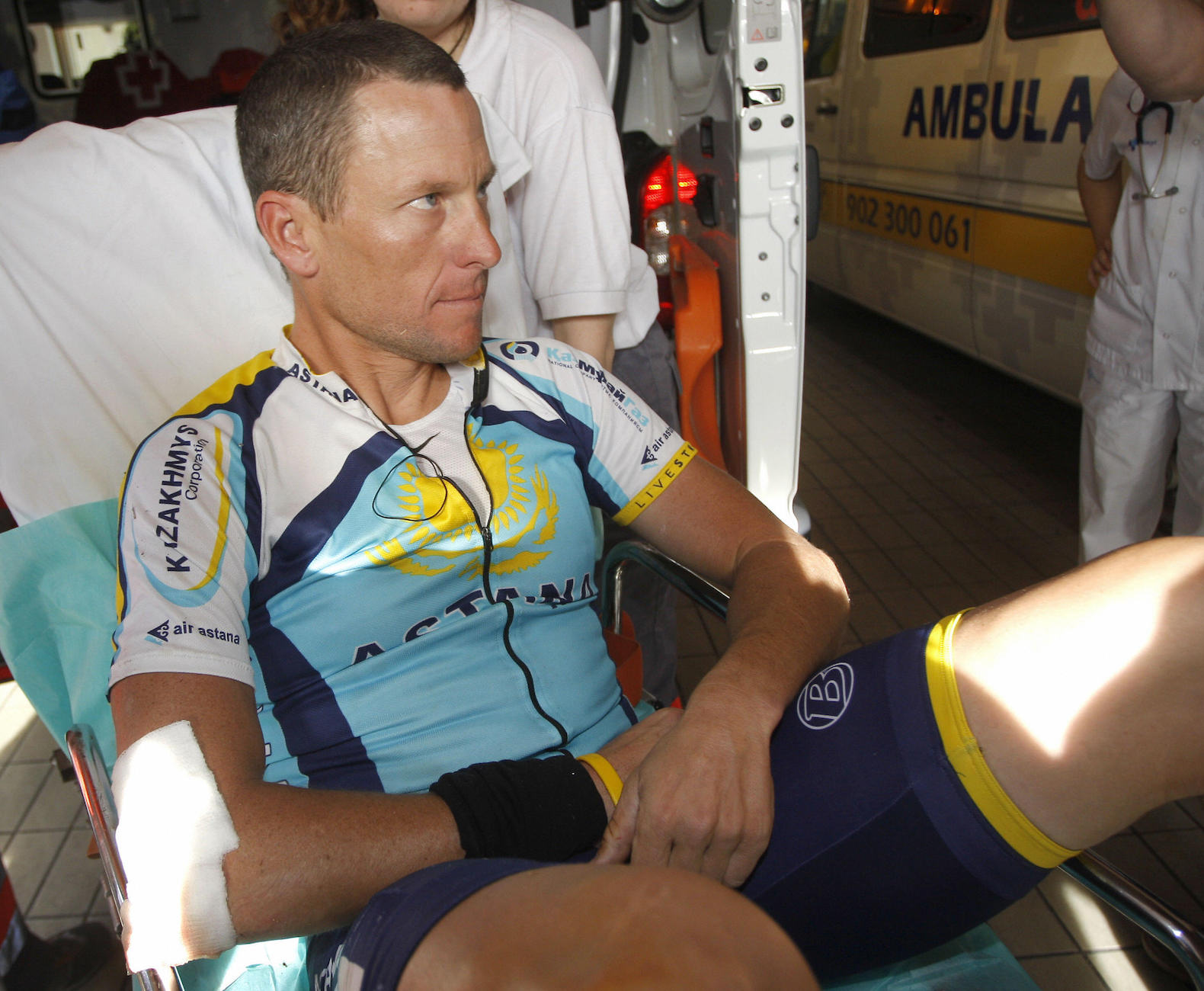
Lance Armstrong (AFP via Getty Images)
(Image credit: AFP via Getty Images)
Armstrong is asked whether he believes his doping caused his cancer: "I don't know the answer to that, and I don't desire to say no considering I don't think that's right either, I don't know if it'south yes or no, only I certainly wouldn't say no," he says.
"The merely affair I will tell you is the only fourth dimension in my life I ever did growth hormone was the 1996 season, so just in my caput I'm similar 'growth, growing hormones and cells, if anything practiced needs to be grown information technology does, but wouldn't it also make sense that if anything bad was there it as well would grow?'"
After recovering from cancer, Armstrong struggles during his comeback flavour with Cofidis, the French team so dropping him at the finish of the season, and the merely squad that would take him was the US Post team.
Armstrong struggles at Paris-Dainty in 1998, declining to end the start stage. "That was i of the few times in my life I saw Lance where he wasn't sure of himself," erstwhile team-mate George Hincapie recalls.
"I went over and got my ass kicked," Armstrong adds, looking dislocated at this concept.
Was the decision to then start doing EPO again a hard one?
"No," he chuckles, before falling silent. Zenovich waits, then proverb: "because..?" with Armstrong then cursing nether his breath at the prompt to go on before elaborating: "In many ways, and this is not going to exist a pop answer, EPO is a safe drug, assuming certain things: information technology's taken properly, under the guidance of a medical professional person, taken in bourgeois amounts, in that location are far worse things you tin put in your body."
The effect the fallout had on his eldest son
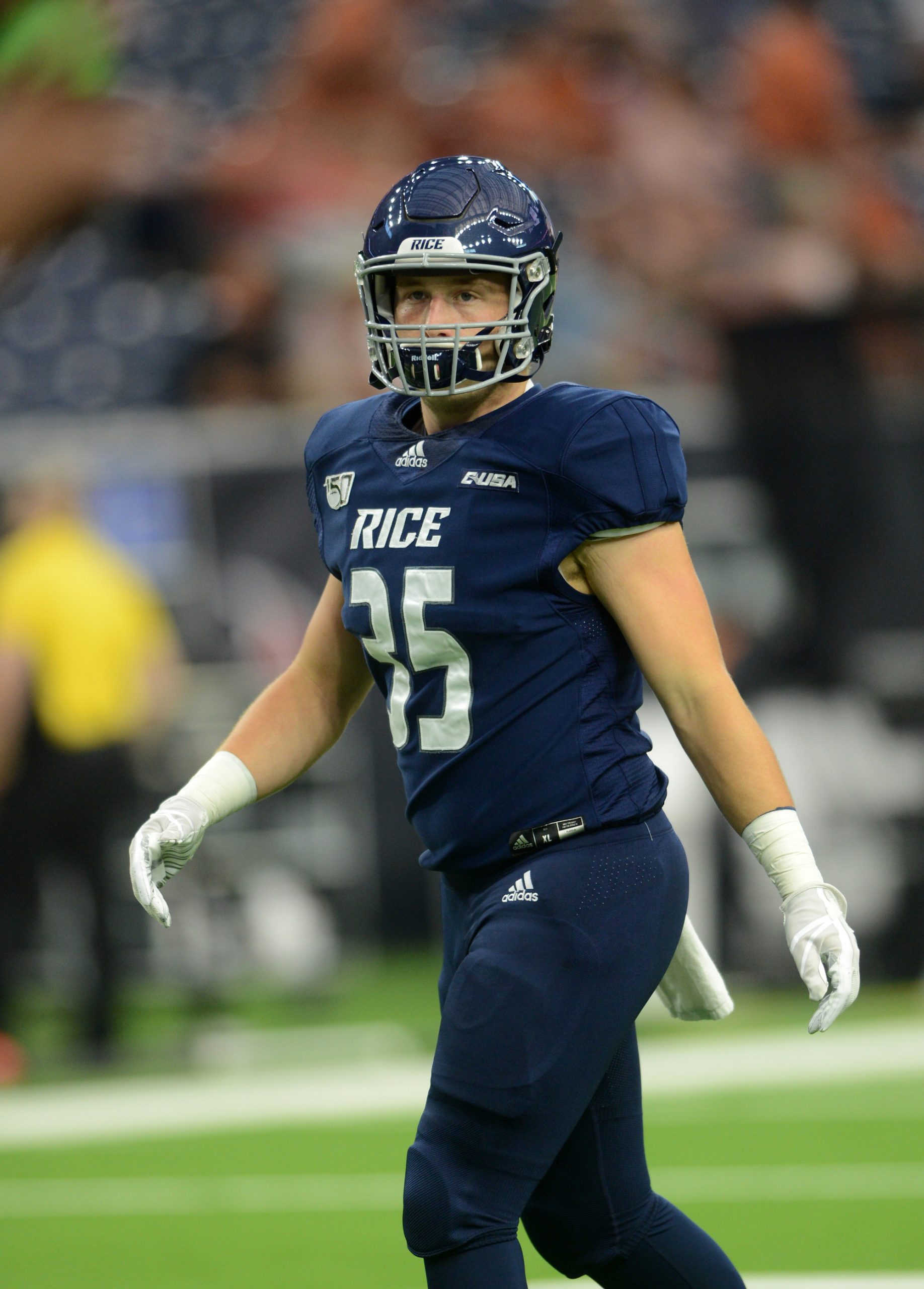
Luke Armstrong playing for the Rice Owls (Photo by John Rivera/Icon Sportswire via Getty Images)
(Image credit: Icon Sportswire via Getty Images)
One item interesting part of the documentary is meeting Armstrong's eldest son, Luke, a higher football histrion. Lance is filmed giving a talk to his son and his squad-mates at Rice University in Texas, where he gets his son's bailiwick of jersey number wrong, with Luke picking him upward on this afterwards.
"I never really bring up who I am as I believe it'll make me come up off every bit someone I'm not," Luke says in his interview.
"I mean it is part of who I am, but at the end of the day it'due south not what describes me, there'south so much more than that."
He'due south asked if he'd always take performance-enhancing drugs, to which he shakes his head. "I hateful for me, I've ever felt grinding for something and actually working for a specific goal has always been so much more worth it than taking a shortcut. I as well feel if I ever did that and got caught, for random people, they would exist like 'he's but like his dad.'"
It'due south a fascinating segment, seeing the truly personal furnishings that Armstrong's doping had on those closest to him. Earlier in the documentary, Lance'south stride-male parent, Terry Armstrong, takes the credit for his footstep-son's competitive streak, saying: "I drove him similar an creature." Lance puts the concrete corruption he suffered a little more matter of factly: "He vanquish the sh*t out of me."
Lance is then asked how he would feel if Luke was to ever employ performance-enhancing drugs.
"If we were always in the position where Luke, who'southward a higher football actor, came to me and said either 'I'd similar to try this' or 'I'm doing this' I would say that's a bad thought. Yous're a freshman in college... it might be a unlike conversation if you're in the NFL but at this indicate in your life in your career, not worth it."
Lance is living up to his promise to be honest at the very least, while Luke goes on to say information technology was important he chose to be an offensive lineman rather than follow his male parent's footsteps into the peloton.
"I recall it was of import that I played football, that [my sport] wasn't cycling so that I had my own path to exist myself, to be Luke and non be Lance's son."
Both Luke (and Lance'south son) were 12 years old at the time of the Oprah Winfrey interview.
"My dad eventually had to sit down me down and say [doping] happened, [what they're saying] is right, terminate sticking upwards for me, trying to protect me," Luke says. "To receive that news as a piddling child, that really flipped my world upside downwardly."
He insisted on going into school the aforementioned twenty-four hour period: "I didn't want to testify it was really affecting me."
His mum, Kristin, recalls dropping him off that day, with kids crowded on the lawn at the front of the school.
"He took a step out that car and a stride into existent manhood, information technology broke my eye into a chiliad pieces," Kristin admits.
In the Oprah interview, Lance said: "He [Luke] never said, 'Dad, is this true?' He trusted me."
Treatment of Emma O'Reilly and Filippo Simeoni is 'the worst matter he's ever done'
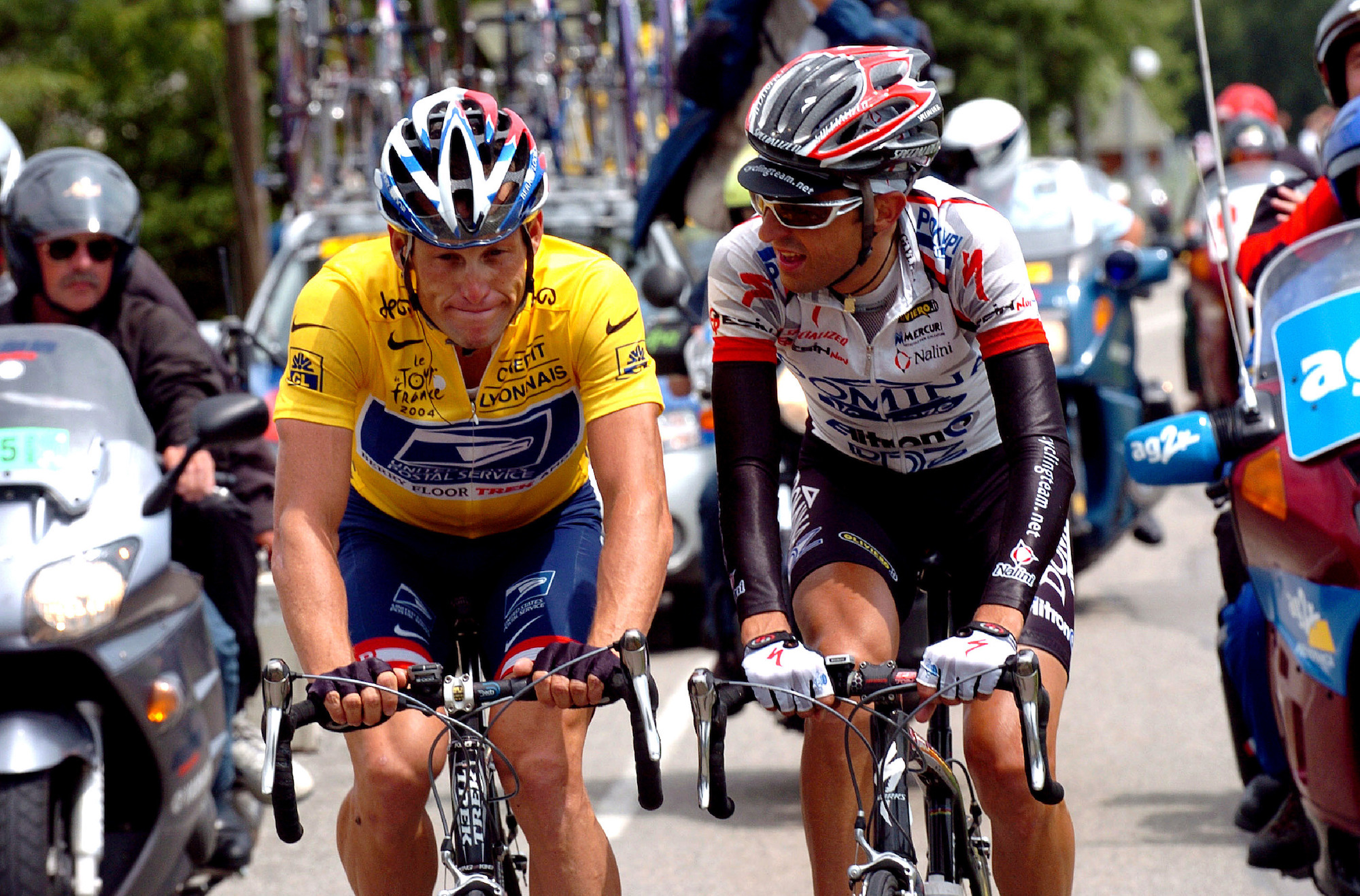
Filippo Simeoni and Lance Armstrong (Getty)
(Epitome credit: Getty Images)
"What's the worst thing you've ever done?" Lance is asked, promptly flipping it around. "Everyone in the world needs to get this question," he responds, however non anybody has had to settle a $100m lawsuit with the federal government of the United States or chosen a colleague a whore in sworn testimony.
That colleague was Emma O'Reilly, the soigneur at US Postal Service who told the Sun Times' David Walsh about the doping that had been going on.
"To telephone call a woman a whore, it'due south hard to be worse than that," Armstrong admits. "I was an idiot and in total attack mode, that's why I did information technology. I would have said annihilation."
"I couldn't be a different person off the wheel, there was no getting in my way, and it worked really well for preparation and racing. Perfect for that. It just doesn't work well with another human being who'south not in the race."
Aslope O'Reilly, Armstrong says his treatment of Filippo Simeoni was another of his biggest regrets; the Italian rider had testified against Michele Ferrari.
Armstrong had "vindictively," as Vaughters describes it, chased down Simeoni later on he had got himself into the breakaway on stage 18 of the 2004 Tour de France, his punishment for spitting in the soup.
And then, one time Simeoni is dorsum in the peloton, Armstrong looks at the Television receiver camera and motions zipping his lips. "You cannot go anymore fundamentally evil than that," Vaughters concludes.
Charles Pelkey, a former editor of VeloNews, says this should have been an embarrassing episode for Armstrong, except the American was "getting away with stuff".
"Simeoni is right up at that place with Emma," Armstrong concedes. "To stoop to that level, that'southward not what a champion does."
Armstrong went to visit Simeoni in 2013 to say sorry. The Italian said to him: "For nine years, my entire life is associated with you lot."
"This was a guy who was a multiple Italian champion," Armstrong explains. "He'd won some races, but everybody remembered that 24-hour interval because I was a f*cking asshole. It just takes those days and hearing those things to learn and exist like okay, what you idea was bad was really way worse," Armstrong says, tearing upwards.
No olive branch for Floyd Landis
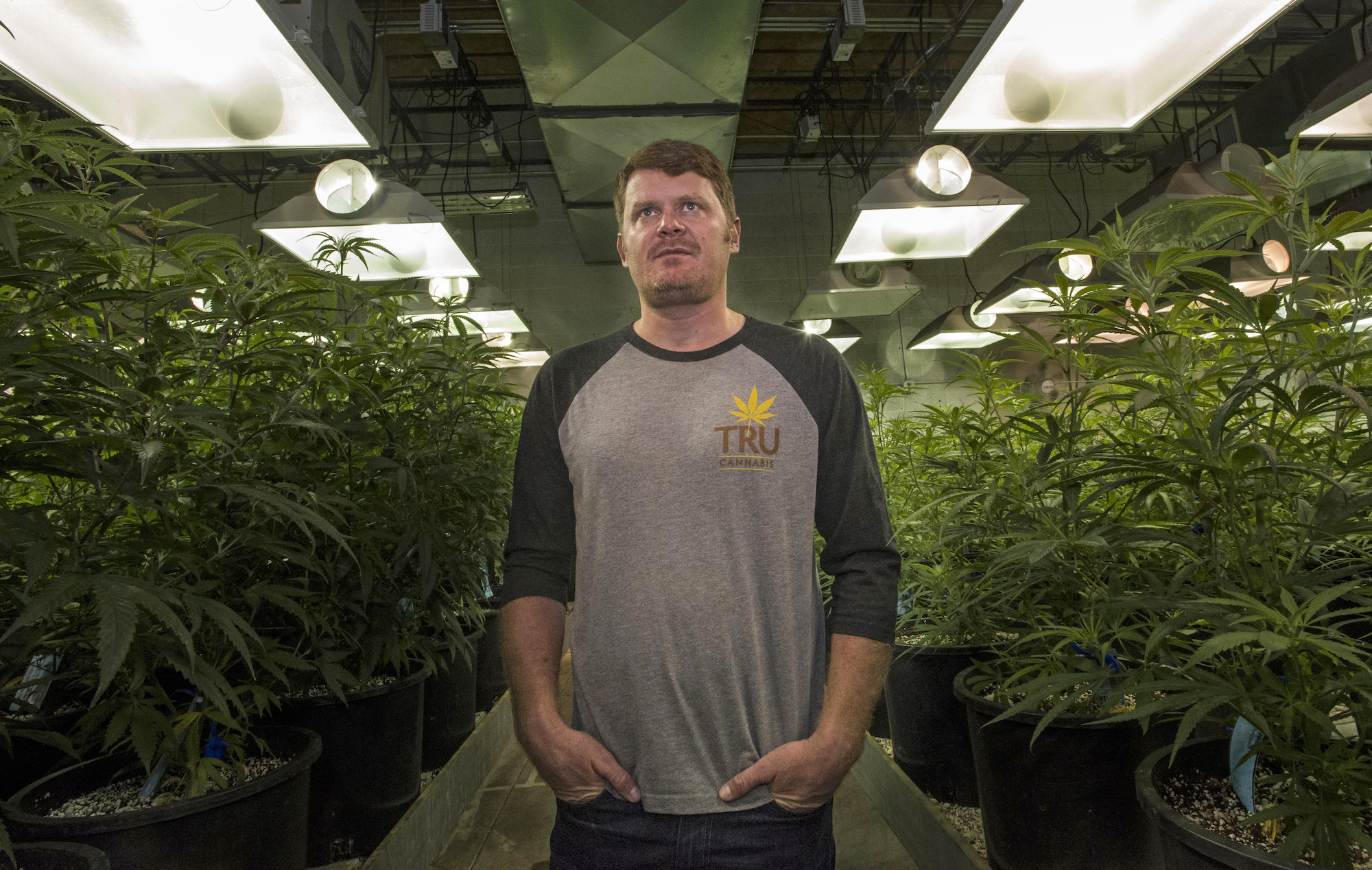
Floyd Landis in the production lab of TRU Cannabis in Denver, Colorado (Photograph by Howard Simmons/NY Daily News via Getty Images)
(Paradigm credit: NY Daily News via Getty Images)
"It could be worse, I could be Floyd Landis, waking upward a piece of sh*t every day," Armstrong goes on to say.
"That's what yous think?" replies Zenovich.
"That's what I know, not what I think, I know."
While Armstrong is apologetic for his treatment of O'Reilly and Simeoni, his wrath remains for Landis. His former squad-mate had revealed in 2010 that both he and Armstrong had doped, rattling off emails to officials at governing bodies and anti-doping authorities telling them everything.
Years earlier, another one of Armstrong'southward former squad-mates who had left US Mail service in pursuit of individual glory was Tyler Hamilton. Afterward winning the Tour de Romandie in 2004, the American had finished second in the Critérium du Dauphiné, chirapsia Armstrong on the time trial up Mont Ventoux.
"I've heard from sources that he was pissed, and he called the UCI, this is what I was told, and he said 'you lot've got to get this guy'. Sure enough, they called that night.
"And then I don't know, it most likely happened. If I had to estimate one way or another I'd say most likely yeah, he had something to exercise with me getting caught." These allegations are, still, not put to Lance in the documentary.
If what Hamilton says is truthful, there is a cognitive noise that remains betwixt the rules that utilise to everyone else and the rules that employ to Lance Armstrong.
"There will never exist a relationship," Armstrong says of him and Landis. "Most people I'k fine to forgive and forget but there are a few I'm not in that location with yet."
This documentary clearly hasn't put the whole story to bed just all the same.
The burn and fury inside Armstrong rages on
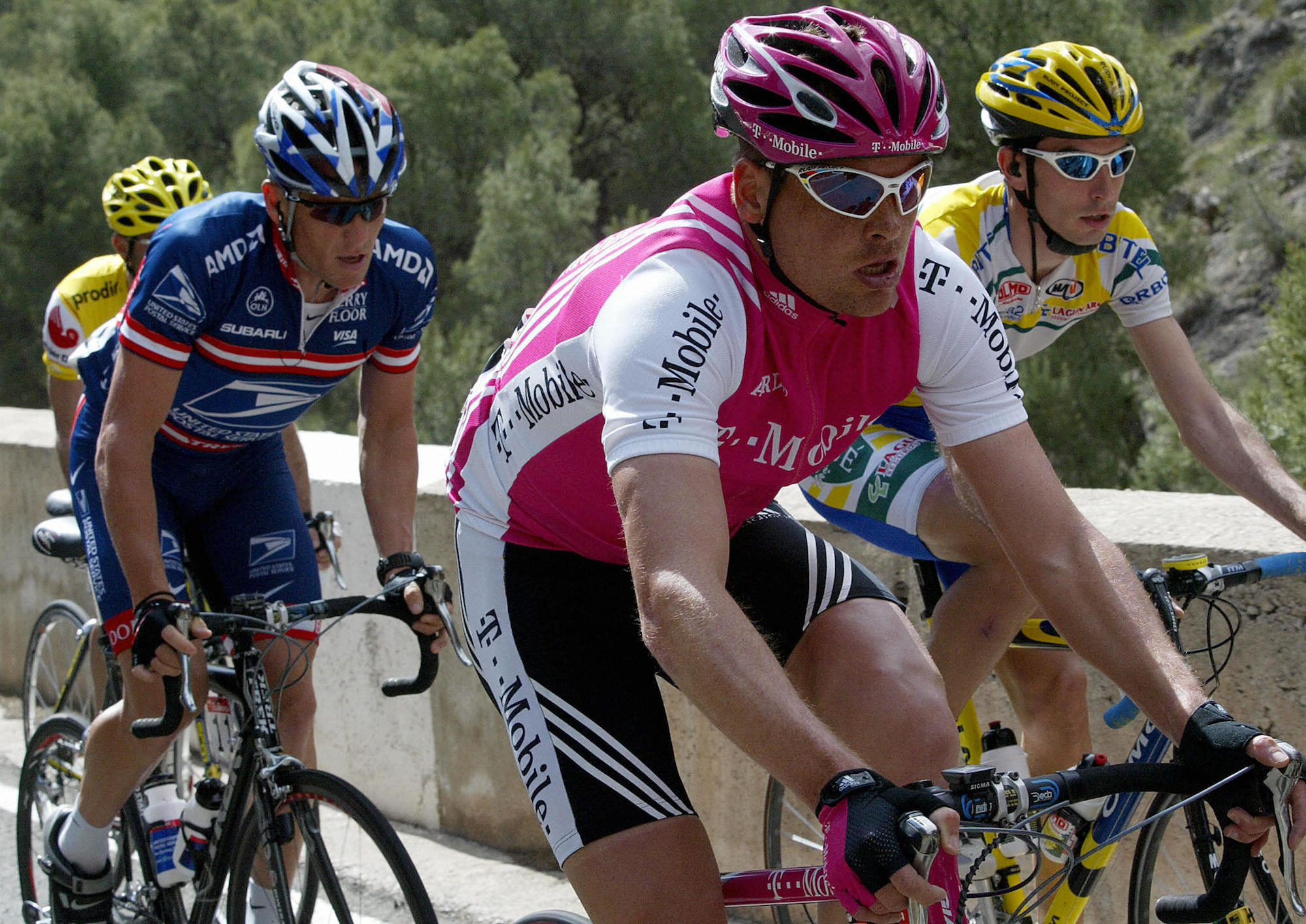
Lance Armstrong and Jan Ullrich (Franck Fife/AFP via Getty Images)
(Image credit: AFP via Getty Images)
Equally the documentary reaches its end the storytelling becomes more reflective, prompting Armstrong to try and necktie the narrative neatly together, an almost impossible task.
While he is insistent that he'southward happy to deal with any regrets, "I've told you lot numerous times, I wouldn't change a thing," the final sentiments on how Armstrong perceives the fickleness of who is and isn't held to account for his generation'due south sins as flawed.
Armstrong had been trying his all-time to come across a more measured, mature character over the condensed three hours of the 18 months spent filming, the Floyd Landis flare-up bated. But when the conversation turns to January Ullrich and the bug the German has faced over the past few years, Armstrong is unleashed, brought to tears when discussing visiting the German in 2022 before descending into a rage within a affair of seconds.
"Information technology's just a terrible situation. Jan was in that era, that cesspool that nosotros were all in, and he got defenseless, nosotros all got caught, and the reason I went to encounter him is I love him," Armstrong says, and then struggling to compose himself for a minute.
"Anyways, it was non a proficient trip. He was the most of import person in my life. Nobody scared me, motivated me. The other guys... no disrespect to them, didn't get me up early on. He got me up early. And he was only a f*cking mess.
"When I look at Jan's situation and I look at my situation, because they're very similar, the timing is very similar... he had all the things I had. He had a wife, children, coin, and that wasn't enough to continue him together.
"And the fucking sport did it to him. And the media permit him do it.
"The state of Italy glorifies Ivan Basso, idolises him, puts him upwardly in that location, gives him jobs, invites him to races, puts him on TV, he's no different than any of the states. Yet, they disgrace Marco Pantani, they destroy him in the press, they kick him out of the sport and he's dead. He's f*cking dead.
"The country of Germany idolises Erik Zabel, Rolf Aldag, gives them jobs, puts them on TV, invites them to races, puts them on the podium, and they disgrace and they destory and they f*cking ruin Jan Ullrich'south life. Why?
"The country of America idolises, worships, glorifies George Hincapie, invites him to races, gives him jobs, buys his southward*striking and they disgrace and destroy me. That's why I went [to visit Ullrich], because that'southward f*cking bullsh*t."
As for the last example, Armstrong had already answered an hour earlier why he is scapegoated above all.
"Information technology might be one lie [for one rider who doped] because you answer once, or in my instance information technology might be 10,000 lies because you've answered 10,000 times. And and so you take it a pace farther and reinforce and go 'don't you ever inquire me that f*cking question once again. And and then y'all go sue somebody and then it only... so that'south why it was 100 times worst. Because nosotros all lied."
"I don't fifty-fifty know where the line is anymore betwixt good people who do bad things and bad people who do good things," says Peter Flax, former editor-in-primary of Bicycling Magazine. "In that location is this Shakespearian quality to the whole thing, y'all just have to enjoy the infinite complexity of the characters considering there are no obvious bad and good guys."
The Sunday Times' David Walsh wrote in his column that Armstrong didn't like the documentary when sent a copy, and didn't show up to the premiere at the Sundance Film Festival. No affair how many articles or documentaries are written and made most Lance Armstrong, volition the story ever truly be over?
The total documentary will be released on ESPN Role player, with part ane available from Monday, May 25 while function two will be released from June 1.
Source: https://www.cyclingweekly.com/news/latest-news/seven-things-we-learnt-from-the-new-lance-armstrong-documentary-456506
0 Response to "Lance Armstrong Learned to Walk Again"
Post a Comment